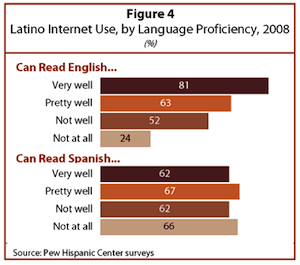One of the most interesting aspects of Facebook’s recent demographic study was the finding that Latinos were joining the service in considerable numbers. There wasn’t much analysis around this point — which was a shame — but a just-released report from the Pew Hispanic Center picks up a lot of the slack. “Latinos Online, 2006-2008: Narrowing the Gap” looks at how Internet use among Latinos changed between 2006 and 2008. The full report is available here. It’s a quick and recommended read for any news organization — English- or Spanish-language — interested in understanding its Latino readers. Here’s a couple findings that caught my attention as I dug into the study.
 English literacy = more Internet use — Most Internet content is in English; some say 80 percent, others say less. Whatever the number, there appears to be a direct connection between knowledge of English and Internet use. The usage gap between Latinos who are fluent English speakers and those who can’t speak English at all is a whopping 57 percentage points. Spanish fluency doesn’t appear to affect Internet use among those surveyed.
English literacy = more Internet use — Most Internet content is in English; some say 80 percent, others say less. Whatever the number, there appears to be a direct connection between knowledge of English and Internet use. The usage gap between Latinos who are fluent English speakers and those who can’t speak English at all is a whopping 57 percentage points. Spanish fluency doesn’t appear to affect Internet use among those surveyed.
Growth among less educated and lower earners — Internet use was generally flat between 2006 and 2008 for Latinos with at least a high school degree and those who make more than $30,000 annually. The big changes came from groups below these thresholds. In 2006, 31 percent of Latinos without a high school degree went online. That increased to 41 percent in 2008. Similarly, 39 percent of Latinos who make less than $30,000 per year went online in ’06, and that increased to 56 percent in ’08.
The role of mobile Internet access — A Pew study from April ’09 found that English-speaking Latinos are the “heaviest users of wireless onramps to the Internet.” That finding appears to dovetail with this latest report, which notes that at-home Internet use among Latinos only increased slightly, from 79% in 2006 to 81% in 2008 — lower than numbers for blacks and whites. The report suggests heavier Internet usage from cell phones as a likely explanation for the gap.
Increasing broadband usage — While a lot of political attention is directed at increasing broadband access, the Pew study finds Latinos (and others) are signing up on their own. Latinos with broadband at home increased from 63 percent in 2006 to 76 percent in 2008. Blacks went from 63 percent in ’06 to 82 percent in ’08. And whites grew from 65 percent to 82 percent. It’ll be interesting to see if the current broadband push influences the adoption pattern in years to come.